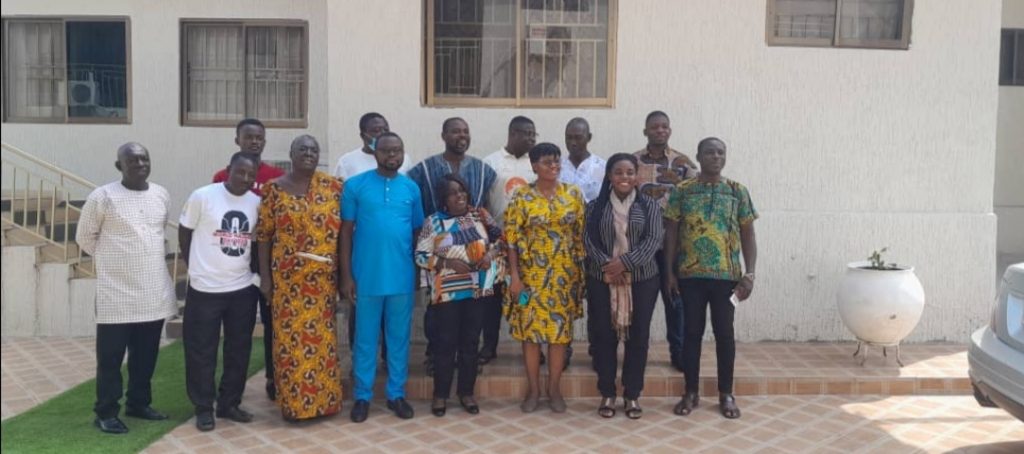Endeavour to engage directly farmers, miners and other local stakeholders in decision making to curb child, forced labour–Rainforest Alliance

The Senior Project Manager of the Rainforest Alliance (NGO), Mrs. Joyce Poku-Marboah has called on government and companies operating in the cocoa and gold mining sectors of the country to always endeavour to engage meaningfully and directly with the community folks, farmers and miners within the communities in which they operate so as to be able to come up with the relevant interventions and initiatives that would inure to the benefit of the communities.
She contends that such an engagement should be based on mutual dialogue between all the parties involved where views of the communities can be sought for consideration and implementation leading to transformation of lives rather than a form of imposition likely to defeat a good cause.
Mrs. Poku-Marboah made this known in an interview with journalists on the sidelines of a 2-day capacity building workshop organized for leaders of various Community Based Organizations (CBOs) working within cocoa and gold sectors across the country on June 16-17, 2022.
Country Director of the Rainforest Alliance Ghana/Nigeria, Mr. Kwame Osei hinted that the workshop was aimed at equipping the participants with knowledge and skills needed to effectively report on government and companies’ commitments in the cocoa and gold mining sectors of the country.
He also stated that this assignment will take place in selected cocoa and gold mining communities and will focus on commitments relating to tackling child and forced labour in the Ghanaian cocoa and gold mining sectors.
According to him, the ‘Yen Mma Daakye Nti” project funded by the Norwegian government through the Norwegian Agency for Development Cooperation (NORAD) is aimed at tackling child and forced labour in the Ghanaian cocoa and gold mining sectors.
“The ultimate goal of the project is to have children and vulnerable people in cocoa and gold-mining communities in Ghana achieve increased socio-economic resilience and are protected against forced labour and the worst forms of child labour”, he posited.
The participants numbering 16 in all, 8 of whom are leaders of CBOs were drawn from the Ashanti, Western, Western North, and Eastern Regions of Ghana respectively.
They were enlightened on child and forced labour concepts and issues in the context of cocoa and mining sectors in Ghana, how to report commitments of government and cocoa and mining companies, the technicalities involved in community entry, as well as how to engage local community montors to work and to effectively utilize a mobile application designed to be used as working tool.
The CBOs are being engaged under an initial agreement which spans six (6) months. Within this period they are to effectively report the commitments of government and companies within cocoa and mining sectors earmarked under the project and together with the communities develop an advocacy strategy.
She indicated that out of the 15 CBOs who were trained in December 2021 at a workshop organized by her outfit, 8 of them have been selected to effectively monitor and report on commitments within 40 cocoa and gold mining communities with the support of monitors on the ground as part of the NORAD project initiatives.
“The project will be working with 8 CBOs in the 40 communities to ensure that commitments by government and cocoa companies towards eradicating child and forced labour are met”.
While charging the participants to assiduously commit to work in order to meet the objectives, she tasked each one of them to endeavour to come up with an advocacy strategy at the end of the 6 months contract period which will help facilitate dialogue between all parties under the initiative.
For his part, the Executive Director of Edmark Rescue Foundation (a beneficiary CBO), Edem Damanka described the workshop as very educative and empowering owing to the knowledge and skills it imparted.
When asked what his views about the project are, he quickly said: “the activities under this project are very important because it will help track the progress being made by the government, including the cocoa and mining companies as well as serve as a reminder on certain commitments made which they have failed to fulfil”.
Source: Joseph Wemakor

 Good Grow: The Marijuana Farm Founded by Akufo-Addo’s Daughters
Good Grow: The Marijuana Farm Founded by Akufo-Addo’s Daughters  National Food Suppliers for Free SHS set to picket at Education Ministry
National Food Suppliers for Free SHS set to picket at Education Ministry  Information Ministry justifies ¢151k paid to staff as Covid-19 risk allowance
Information Ministry justifies ¢151k paid to staff as Covid-19 risk allowance  I’ll help farmers with tractors to increase productivity – Bawumia promises
I’ll help farmers with tractors to increase productivity – Bawumia promises  CETAG meets national teaching council to conclude on strike
CETAG meets national teaching council to conclude on strike  Adom Kyei Duah cannot be the Jesus that Christians seek – Christian Council of Ghana
Adom Kyei Duah cannot be the Jesus that Christians seek – Christian Council of Ghana  Bawumia’s smartphone pledge misguided and visionless – Adongo
Bawumia’s smartphone pledge misguided and visionless – Adongo